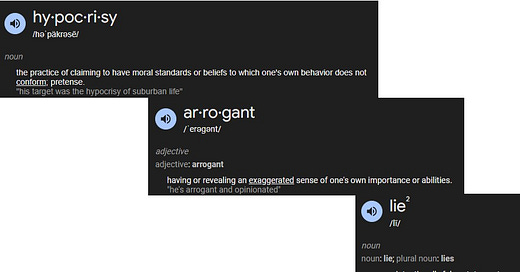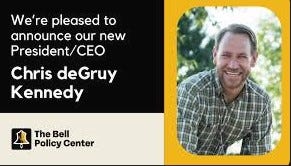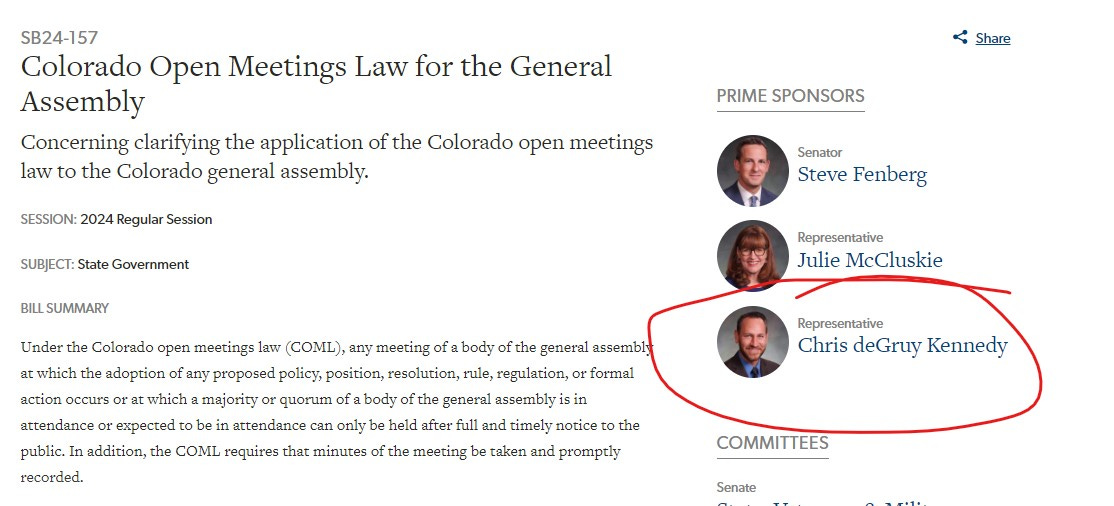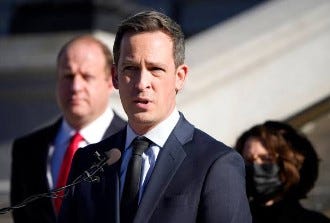Rep Willford, Former Rep DeGruy Kennedy, and Sen Fenberg put their ignorance, arrogance, hypocrisy, and lies on display when talking about ballot measures.
A deep dive into how three (at least) Democrats view citizen's initiatives.
This is post 1 of 3 today that all stem from a single article. The article itself is linked below.
It was such a showcase of the kind of ignorance, lies, hypocrisy, and arrogance we've come to expect from Colorado Democrats' extended one-party control of this state that I felt it deserved its own day to fully explore.
The nominal topic of the article is about the citizen initiative process: our ability as citizens and/or non-legislative groups to add amendments to our constitution and or laws to our books. This applies both (except for the state constitution obviously) to both the local and state level.
The rules of this process are spelled out in our state's constitution,* and is one of the things that makes our state unique. To quote the article:
"Only Colorado and 25 other states have a process for citizen-initiated ballot measures, or initiatives brought to the ballot by private interests that are able to gather a required number of signatures from supporters. Almost every state allows for measures referred to the ballot by their legislatures."**
It seems that this ability for citizens and/or private interests to take a direct hand in making laws has given a few Democrats some heartburn. If you look at their comments in detail, and then reflect back to past actions by they themselves, or those in their party, it doesn't paint a very flattering picture.
It paints a picture of at least a few (and I would venture to say likely more given how votes have gone lately) legislators see themselves as better able to make value judgements than you.
It paints a picture of those same folks figuring that you do not possess the ability to reason or a functioning memory.
It paints a picture of those same folks figuring the values you should be held to (and that they sometimes profess), don't or shouldn't apply to them.
Let's jump right in with the first example.
The beginning of the article concerns a tussle by some lawmakers over oil and gas-related ballot measures that, according to the article, would have "directly contradicted the Democratic majority’s environmental policies".
The eventual outcome of this fuss was that some of the more onerous bills put forward were scrapped and the groups supporting ballot measures dropped those efforts.
This result was the result of non-public, backroom dealmaking between Polis, some environmental groups, and some (though not all, certainly none of the smaller locals) of the big players in oil and gas in Colorado. If you want a brush-up, I linked to my earlier newsletter which covered the issue not too long after the deal was struck.
With that background, let's look at one Democrat lawmaker's reaction, quoted in the article:
“'That's a really scary proposition [the idea that oil and gas groups could run a ballot measure], which puts you in the place where you have to make a deal, or else,' Democratic Rep. Jenny Willford, a sponsor of the proposed regulations, said."
“'The fact that they can do that and use it as a way to force legislation or force compromises,' Willford said. 'I get that it’s part of the process, but it also feels really icky.'”
As you'll note in later posts today, this is on the milder end of the spectrum. Still, it highlights some of what I point to above: what is "icky" about sharing power, about compromise, about the idea that your vision for this state might not be the only one, that it might be, in fact, an extreme one?
It also points to (willful?) ignorance on the part of this particular representative, a turning of a blind eye.
Is it not, after all, "icky" to have closed-door meetings that the public can't see? Is it not "icky" to have the governor call in the big, monied groups (both environmental and industry) to come to a compromise while necessarily excluding some?
Just like he's done in the past with Altria and his Prop EE funding measure?
Stick around for posts 2 and 3. It gets worse and more overt.
**A document which, incidentally, devotes much more space and words to how we citizens can change our laws than it does to how the legislature works and writes laws.
**Missing from this list, and still worth a mention, is our ability as citizens to remove newly-enacted laws that don't have the so-called ("so-called" because of its routine abuse by legislators) emergency clause. This is a different post, however.
https://www.kunc.org/news/2024-07-22/private-interests-are-using-ballot-measures-to-influence-state-laws-its-worrying-lawmakers
https://open.substack.com/pub/coloradoaccountabilityproject/p/more-secret-backroom-deals-with-big?r=15ij6n&utm_campaign=post&utm_medium=web
Former Rep (now leader of the uber-progressive Bell Policy Center) Chris DeGruy Kennedy's strong words about ballot initiatives could very easily be turned around to his (and other Colorado Democrats') actions.
Let's turn to the same article I used in post 1 (linked here again for convenience), but a different section. After Rep Willford's comments referenced earlier, the article moves on to Initiatives 50 and 108. For some background, I've included earlier newsletters on these initiatives, in chronological order.
These initiatives run directly counter to efforts by the governor et. al. on property taxes, and they apparently make former-Rep (now leader of the Bell Policy Center) Chris DeGruy Kennedy bristle. Kennedy being, of course, one of the people who contributed greatly to the legislative "fix" for property tax problems.
You get a sense of his attitude in the quotes he gave to the article:
“'There's some indication that they're [Advance Colorado, the group funding the ballot measures running counter to the legislature's efforts] still trying to prompt action,' DeGruy-Kennedy said. 'They're trying to put on the strongest possible front to try to coerce the governor into calling a special session to cut taxes even deeper.'”
I'm sorry to step in on a group of quotes, but I'm irritated enough to not let this pass without immediate comment. There is no (repeat NO) cutting of taxes in the bill that passed the legislature this session. It is a reduction of an increase. Continuing with quotes ...
"Ballot initiatives are also one of the only ways conservative interests can counter the strong Democratic majority in the legislature, and DeGruy-Kennedy said the group is circumventing the transparency and public engagement that comes with representative democracy by running ballot initiatives."
“'When these wealthy interests are able to do whatever the heck they want without having to engage in the process that the legislature engages in, it ends up just being all about their own self interest,' DeGruy-Kennedy said."
Let's go in order.
Is there an issue with trying to call for a special session to fix a problem that the legislature deferred for two years, did a half-assed ballot measure (which lost miserably) on, and then gave us another glass of lukewarm used dishwater this last session?
If someone at your job was unsatisfied with your job performance, at least one of whom was a supervisor, would you dream of bemoaning how they're wanting you to try again for a fix in public? What kind of attitude does that convey?
Further, what kind of attitude does it convey when you say that lowering taxes would only benefit a narrow group of wealthy interests? Does he pay property taxes? Has he seen his bill go up?
Let's, finally, address DeGruy Kennedy's impressions of what the legislature does, doesn't do, and the implicit assumption about your ability to act and decide in your own best interest.
I mentioned earlier the "transparency" and "public engagement" of our governor in his backroom deal on oil and gas, so I won't rehash that here, but I would like to point out the "transparency" and "public engagement" involved in exempting the Colorado legislature from Colorado Open Meetings law. This was bill SB24-157, linked fourth below.
To see who sponsored that bill, I took a screenshot. Peekaboo, DeGruy-Kennedy, I see you!
As to process, I'd like to point out that initiatives undergo a process that is actually, and fully (not partially like our legislature's) open to the public. I've written about it numerous times, so I won't lay out the process in full here, but there are multiple steps for public engagement with the ultimate steps for engagement being, of course, the petition to get it on the ballot and the ballot itself.
You, however, not engaging in THEIR process (a process that I again remind you they have chosen to hide) do not apparently know enough to recognize when something is in your interest or not. When it comes directly to you for you to decide on directly, it's circumventing having those that know better deciding for you.
Hold that thought for part 3 where we let Senator Fenberg weigh in.
https://leg.colorado.gov/bills/sb24-157
Senator Fenberg's words on the topic of ballot initiatives betray (at least) a loose connection to reality. At worst, they betray a loose connection to honesty.
Let's wrap up the day with some thoughts by Senate President Steve Fenmberg.
I'll start this post with the man's own words. The extended quote below comes from the same article I've referenced all day (again, copied here for convenience's sake):
"Another issue with ballot measures is implementation. Senate President Steve Fenberg said that’s in part because legislation requires input from diverse interests, whereas ballot initiatives don’t. 'That's how you get better policy with more people weighing in on it, more people discussing it,' Fenberg said. 'Kind of like kicking the tires and figuring out what the unintended consequences could be.' ... At the end of the day, though, Fenberg said ballot measures play an important role in Colorado. 'It's not to say that voters shouldn't have direct democracy,' Fenberg said. '[Ballot initiatives] should be used as a way to force an issue, rather than set prescriptive policy in stone.'"
So as to not belabor the point, I'll skip over the obvious here about Senator Fenberg's connection to the law that exempted the Colorado legislature from open meetings law (he too was a sponsor if you go to post 2 and see the picture there).
Let's focus here on Fenberg's discussion of input from diverse interests, more people discussing things. Analogously to what DeGruy Kennedy said with regard to legislative process, you see Fenberg touting the process the legislature undertakes in making laws vs. the lack of varied input (as Fenberg sees it) in a ballot proposal.
Hogwash.
Sticking first to low-hanging fruit, I ask you what could involve more input from diverse interests and perspectives than to have every. single. registered voter in the state think over and then weigh in on whether or not something is a good idea?
I also ask you to consider how much input you get in the legislative process that Fenberg here brags about. I wrote an op ed late last year on the topic (linked second below), but I can illustrate this here simply.
Whenever you hear a legislator talk about a "stakeholder", remember that ain't you. You're there simply to write the checks NOT to have a hand in policy.
You might (if whoever is managing the calendar is nice enough to not schedule things so that a normal human with a life outside the Capitol could have a reasonable chance to testify) get a chance to weigh in on a bill as it's considered, but the Colorado Democrats have resolutely denied multiple attempts to allow you to see legislation prior to its committee assignment.
Check out links three and four below for a couple efforts that have gone nowhere (the third dying in committee, the other dying on the vine as Dems pushed it off and got busy).
This all sidesteps the continued allegations by multiple groups that they were not consulted or included in discussions about upcoming bills. This includes, interestingly enough, groups that Dems are normally favorable to. I remember hearing more than once during committee hearings last session about unions saying they were not part of any discussions on the legislation at hand.
No. You get to directly weigh on ballot measures. You may, if you're lucky enough and/or from a group the Democrats deem worthy enough, or may not get a chance to weigh in on legislation.
I won't go too much deeper into Fenberg's last remark (about ballot initiatives there to "force" an issue) save to note that no one needs to force an issue with a legislature and legislators that are responsive to the people and with legislation that is thoughtfully done.
Elections have consequences and the utter chaos of the Republican party, a lack of attention paid, and demographics have all combined to put Colorado in a condition where we have leaders that can, with a straight face, talk the kind of nonsense you've seen in these three posts. A condition where they can completely unselfconsciously say the kinds of things I've highlighted.
One party control of this state, one party control by the same faces year after year, has brought us here. Do what you can to start helping this start tilt back to center and back to reason, to tilt us back to where our policymakers respect us more than the quotes here show they do currently.
https://leg.colorado.gov/bills/hb22-1096
https://leg.colorado.gov/bills/hb24-1022
Related:
My recent op ed offered as an example of how (in this case with the media and not the legislature) you are just a checkbook, not a participant whose voice matters or ought to be amplified.
https://pagetwo.completecolorado.com/2024/07/13/gaines-coverage-of-rtd-should-include-those-who-foot-the-bill/






